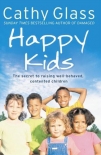Happy Kids, Cathy Glass [best ebook reader for ubuntu .TXT] 📗

- Author: Cathy Glass
Book online «Happy Kids, Cathy Glass [best ebook reader for ubuntu .TXT] 📗». Author Cathy Glass
Maintain family time Keep family time, and go on outings (despite your teen’s grumbles), just as you did when they were little. Doing this helps cement family relationships and bonding, and reduces confrontation and rebelliousness. However, you might have to adjust the extent of your child’s participation. While you took your five-year-old to visit Granny twice a week, visiting that often might not be appropriate for a twelve-year-old who has homework and club activities – fortnightly might be more practical.
Give responsibility Give your son or daughter age-appropriate responsibility and encourage self-reliance so that he or she gradually develops the life skills on which to base his or her own (sensible) decisions. The level of maturity reached and life skills acquired at this age vary from child to child, so while it might be appropriate to put a saw in the hand of one thirteen-year-old and ask him or her to saw up logs for the fire, it might not be wise to ask another more impetuous child.
Maintain safety Keep your son or daughter safe. At this age children assume they are safe, and will always be safe, without making any objective risk assessment of the situation. A young teen can sometimes show an astonishing disregard for danger and indulge in very unsafe behaviour, and look totally amazed when you point out that they are at risk. At this age teens are still very naïve, and while they believe they know how to stay safe, they often don’t – they are only just out of childhood and haven’t the life experience to recognise danger in situations which is obvious to adults. When you are met with an indignant ‘But Mum! I’m thirteen!’ in response to something you have asked your child to do, or not do, you can reply, ‘Yes, I know, love, and you are growing fast, but I am not happy about you coming home alone on the bus after dark [or whatever it is]. I don’t think it’s safe.’ And don’t be persuaded otherwise. You are not being over-protective but making a reasonable judgement based on years of experience.
Don’t tease Don’t satirise or make fun of your child or their actions, some of which may appear quite juvenile and silly. Don’t tease, or make your young teen the butt of a joke. Many adults have problems being on the receiving end of a joke or being made fun of, and your young adolescent will certainly not be able to cope with it. They will take it personally and will feel very embarrassed and resentful, especially if there is an audience and everyone has looked at them and laughed. Children of this age are very sensitive and easily become embarrassed and blush.
Try to stop other adults from poking fun at your teen too. Often well-meaning relatives or family friends will have a joke at a young teen’s expense, not intending any harm but trying to make conversation with the self-conscious, silent and gangly youth before them who is unrecognisable from the sociable little boy they last saw. If you are aware that a comment or joke has caused your child embarrassment, mention it lightly to your child when you are alone – ‘That was a silly thing for Auntie Jean to say; of course you wash behind your ears’ or ‘Granddad doesn’t understand that orange-streaked hair is fashionable now.’ There is no harm in siding with your child in this manner; he or she will feel and appreciate your sensitivity and support, although they won’t say so.
Don’t take it personally Don’t expect a lot back in the way of positive recognition for your care and concern on any matter at this age, or else you will be sadly disappointed. Look upon everything you say and do for your child during this period as an investment for a smoother ride through the older teenage years, leading to a self-confident and happy adult at the end of it.
At this age you are an embarrassment to your child, which is why he or she asks you to drop them off round the corner from their friend’s house so you won’t be seen. It’s normal, and I’m afraid it’s something you have to live with if you have a young teen. There’s nothing you could do that would minimise the embarrassment you inadvertently cause your child at this age. Don’t take it personally; they grow out of it. And obviously don’t do anything to embarrass your child. This includes talking loudly in a public place, kissing or standing too close to your child in a public place, returning a faulty item to the shop while they are with you and other similar behaviour. Often just having a parent is an embarrassment for a child of this age, although of course deep down they know that they couldn’t do without you, and love you deeply.
Use the 3Rs Last, but not least, keep the boundaries and guidelines for acceptable behaviour in place, using the 3Rs as necessary. Obviously acknowledge your son’s or daughter’s growing independence and self-reliance, but the rules for respect and good behaviour, both at home and in society, should remain true. You are responsible for your child until they reach the age of majority (eighteen in the UK), when they legally become an adult, so if you don’t want your child to do something, for example, have a body piercing or tattoo, then he or she doesn’t do it (the owner of a body-piercing parlour will need your permission anyway).
Attitude
Attitude is the way a person thinks or feels about someone or something. It is portrayed through their body language and what he or she





Comments (0)